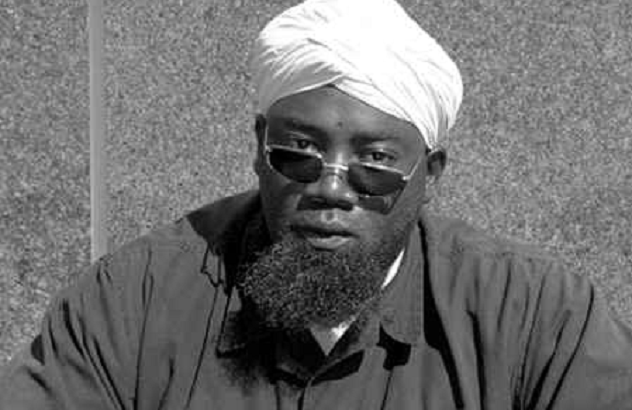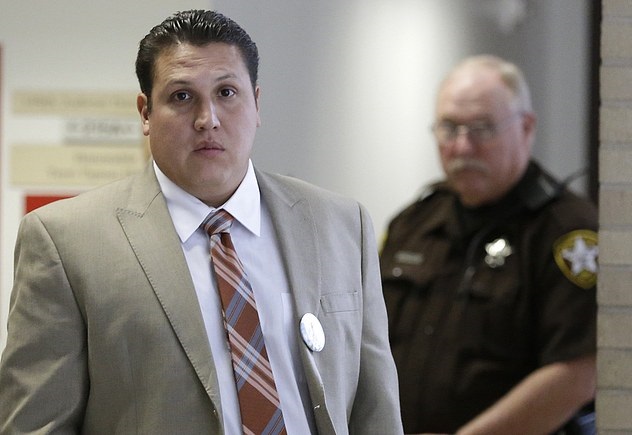 Our World
Our World  Our World
Our World  Pop Culture
Pop Culture 10 Incredible Female Comic Book Artists
 Crime
Crime 10 Terrifying Serial Killers from Centuries Ago
 Technology
Technology 10 Hilariously Over-Engineered Solutions to Simple Problems
 Miscellaneous
Miscellaneous 10 Ironic News Stories Straight out of an Alanis Morissette Song
 Politics
Politics 10 Lesser-Known Far-Right Groups of the 21st Century
 History
History Ten Revealing Facts about Daily Domestic Life in the Old West
 Weird Stuff
Weird Stuff 10 Everyday Products Surprisingly Made by Inmates
 Movies and TV
Movies and TV 10 Actors Dragged out of Retirement for One Key Role
 Creepy
Creepy 10 Lesser-Known Shapeshifter Legends from Around the World
 Our World
Our World 10 Science Facts That Will Change How You Look at the World
 Pop Culture
Pop Culture 10 Incredible Female Comic Book Artists
 Crime
Crime 10 Terrifying Serial Killers from Centuries Ago
Who's Behind Listverse?

Jamie Frater
Head Editor
Jamie founded Listverse due to an insatiable desire to share fascinating, obscure, and bizarre facts. He has been a guest speaker on numerous national radio and television stations and is a five time published author.
More About Us Technology
Technology 10 Hilariously Over-Engineered Solutions to Simple Problems
 Miscellaneous
Miscellaneous 10 Ironic News Stories Straight out of an Alanis Morissette Song
 Politics
Politics 10 Lesser-Known Far-Right Groups of the 21st Century
 History
History Ten Revealing Facts about Daily Domestic Life in the Old West
 Weird Stuff
Weird Stuff 10 Everyday Products Surprisingly Made by Inmates
 Movies and TV
Movies and TV 10 Actors Dragged out of Retirement for One Key Role
 Creepy
Creepy 10 Lesser-Known Shapeshifter Legends from Around the World
10 People Who Got Away With Vigilante Justice
In modern society, when a crime is committed, a judge and jury are typically the ones who handle the punishment. Then are some people who, for varied reasons, decide to take the law into their own hands. The problem is that when they do that, they are often committing crimes themselves. Therefore, law enforcement officials never condone vigilantism, but there are a few cases where someone gets away with dishing out their own punishment.
10David Chen

In May 2009, in Toronto’s Chinatown, 56-year-old drug addict Anthony Bennett stole about $100 worth of plants from the Lucky Moose Food Store. An hour later, Bennett returned to the scene of the crime. Store owner David Chen, along with his cousin and nephew who worked at the store, confronted Bennett about the theft. Things escalated when the Lucky Moose owner and employees tied up Bennett and locked him in the back of the delivery van.
However, in Canada, you’re not allowed to physically restrain someone like that unless they are actively in the middle of committing a crime. So Chen was charged with assault, forcible confinement, kidnapping, and carrying a dangerous weapon (a box cutter). Ultimately, however, the good guy won—Chen and his co-workers had all charges dismissed. The case made national headlines and Chen became a minor celebrity in Toronto. The case also changed Canadian law, when the “Lucky Moose Bill” was introduced which relaxed laws surrounding self-defense and citizens’ arrests. Bennett, on the other hand, pleaded guilty and was sentenced to 30 days in prison.
9Lori Palmer

Growing up, Lori Palmer and Kaylene Phillips were good friends. Lori was even Kaylene’s maid of honor when Kaylene married her husband Scott. They were so close that Lori’s daughter would often sleep over at the Phillips’ home when she had to work nights as a police officer with the Wichita Police Department.
In autumn of 2000—when Lori’s daughter was 12—she told her mother that when she slept over at the Phillips’ house four years prior, she was molested by Scott a number of times. Palmer—now retired from the police department—did the responsible thing and reported the assaults to the police. Soon, however, Palmer decided that the police were taking too long and felt that other children, such as Phillips’ own daughter, were in danger.
Palmer drove to Scott’s work, flashed her police badge, and got Phillips into her car. Then she drove to a wooded area 20 minutes outside the city. There, Palmer made Phillips remove all his clothes and threatened his life if he did not tell the truth about what happened. Standing cold and naked in the middle of nowhere, Phillips quickly confessed to molesting Palmer’s daughter. Palmer then drove him to the police station, where he repeated his confession to the officers.
Phillips was arrested for rape, but Palmer was also arrested for kidnapping with intent to commit first-degree murder. She faced up to five years in prison, but ultimately only received a year’s probation. Phillips, meanwhile, was found guilty of aggravated indecent liberties with a child and sentenced to four years in prison.
8William Lynch

In 1975, when William Lynch was seven years old, he and his brother went on a camping trip that was chaperoned by Jesuit priest Jerold Lindner. Lynch later on said that during that trip, Lindner made him and his brother perform oral sex on each other and then he forcibly sodomized them. The brothers were silent about it for years until the ’90s—by then, however, the statute of limitations had run out, so Lindner was never criminally charged.
Instead, the Lynches and other victims of Lindner sued the church. Lynch and his brother were given a $625,000 settlement in 1997, but Lindner never admitted to the assaults. In fact, while being questioned under disposition, he said that he didn’t remember the brothers at all.
This never sat well with William Lynch, so in 2010 he went to the nursing home where the 67-year-old Lindner was living. He wanted Lindner to sign a confession, but when he confronted the elderly priest, Lindner apparently leered at Lynch, who reacted by punching him “at least twice” in the head.
Now, you just can’t go around punching senior citizens in the face, no matter how despicable they may be. Lynch was arrested and offered a plea deal where he could avoid prison time. However, Lynch wanted to go to trial and bring attention to the priest’s vile past. He pleaded not guilty, despite fully admitting that he punched Lindner. By going to trial, he was looking at up to four years in prison.
When Lindner took the stand on the first day, he denied molesting any children. The next day, he pleaded the Fifth Amendment while testifying—as a result, the judge threw out his testimony. Even the prosecuting attorney told the jury that Lindner would probably be deceitful on the stand. After a two-week trial, Lynch was acquitted of all charges, despite admitting he committed elderly abuse. He was happy that he brought attention to Lindner’s awful past but does regret resorting to violence.
7Samuel Mohammed

Samuel Mohammed lived in a poor neighborhood in West Palm Beach, Florida. Mohammed, who was formerly a bodyguard, grew tired of police not doing anything about an abandoned house in the neighborhood that was used as a crack house and frequented by prostitutes. Taking matters into his own hands, Mohammed went to the abandoned house, checked to see if anyone was in it, and then poured kerosene around the house before setting it on fire.
Mohammed was arrested and charged with arson and burglary. During his trial he was asked by the prosecutor if he would set another building on fire should the situation call for it. Mohammed admitted that he couldn’t rule something like that out. On the day when the verdict was going to be read, he wore a shirt that said “Hit Me With Your Best Shot.” Needless to say, Mohammed was a bit defiant, despite the possibility that he could be sentenced to nine years in prison. He was luckily only given probation and 200 hours of community service.
6Kimberly Cunningham

When Amanda Cunningham was nine years old, her uncle Coy Hundley raped her twice. Amanda didn’t say anything about the rapes until 2003, when she was 14. At the time, she was having behavioral problems—when her mother, Kimberly, asked what was wrong, Amanda finally broke down and told her mother what happened. This was the second time one of Kimberly’s children had been sexually assaulted by her sister’s common law family, as Cunningham’s son had accused Hundley’s son of molesting him.
Prior, Kimberly had taken her revenge on Hundley’s son by smashing the windows of his car. Hearing this new allegation, a livid Cunningham drove over to her brother-in-law’s work in Knoxville, Tennessee to confront him about the accusations. Cunningham was hoping that Hundley would deny the rapes. Instead, he apparently laughed at her and said, “What are you going to do?” That’s when Kimberley shot at him five times with a revolver, before reloading and firing five more times. Hundley was hit four times in the head and four times in the body. Less than an hour later, Cunningham brought the revolver to the police station and turned herself in.
Cunningham was charged with first-degree murder and went to trial. One of the major questions that arose was why Cunningham simply didn’t go to the police in the first place. She claimed that she was afraid of Hundley because he threatened her when she went to the police the first time about his son. If she went to the police this time, she might be putting herself or her daughter in danger.
At her first trial, the jury deadlocked on a second-degree murder charge. During her second trial, she was acquitted of both first- and second-degree murder. However, she was convicted of voluntary manslaughter and given four years in prison. She successfully appealed that conviction and ultimately served six only months.
5Richard Dale Wilson

Joan McShane Mills was engaged to a man named Richard Wilson, but she also had a wild side that involved parties, drugs, and sex with strange men. While on a Los Angeles business trip in April 1983, Mills went out partying and met a man named Jeffrey Parker. Together, they consumed a lot of drinks and snorted some cocaine.
Early in the morning on April 30, paramedics were called to the hotel room where Parker was staying. They found Mills lifeless and Parker frantically trying to revive her. However, it looked like Parker’s CPR attempt was what actually killed the 33-year-old woman. Mills’ family pushed for an arrest, and Parker was charged with murder.
Parker was set to begin trial on August 4, 1983. However, two days prior to the trial, he was walking out of his mother’s house when he was shot twice—once in the head and once in the throat. His mother ran outside and held her dying son. At first the police thought it was a hit man—quite possibly in connection to drugs, which Parker had previously been arrested for. However, since there was no physical evidence, the case sat cold for four years.
That is, until the police got an anonymous tip telling them that Mills’ fiance, Richard Wilson, was responsible for Parker’s murder. Under questioning, Okel Wilson—Richard’s older brother—said his brother told him he planned to kill Parker and then bragged about it after Parker was dead.
Wilson was arrested and charged with murder. He went on trial in 1986, pleading not guilty. The trial lasted four months, with Okel Wilson playing a key role in the district attorney’s case. Wilson’s lawyers were able to discredit his testimony, and after two days of deliberations he was found not guilty. Wilson hugged his lawyers and told the jurors “It’s the last you’ll see of me!”
4Bradley Willman

In the late ’90s, a teenage Bradley Willman was talking to a man in an online newsgroup. This man apparently offered up his six-year-old daughter for sex. Willman contacted the police, and the man was arrested.
This led to Willman creating a Trojan virus in the guise of a picture. He’d post the picture on child pornography newsgroups—when users opened the file, it would seemingly be nothing but a random picture from the directory. However, it would also allow the virus to embed itself within the user’s computer. This gave Willman access to over a thousand individual computers, where he would search for child porn or other incriminating evidence. He’d then send the information along to child pornography watchdog groups.
The problem is that searching through people’s computers without their permission is completely illegal—even dirt bags that collect child porn have the right to privacy. Although Willman was living in Canada, he often broke American state and federal laws, but he didn’t care.
In 2000, Orange County judge Ronald Kline downloaded the virus. On his computer, Willman found over 1,500 pictures featuring young boys and a journal indicating that he planned on seducing children. Like he did with every other creep he came across, Willman passed the information on to a watchdog group who, in turn, passed it on to the police. Months later, Kline was arrested and charged with possession of child pornography.
At his trial, Kline’s defense challenged the legality of the virus, but it wasn’t enough. Kline was convicted and given 27 months in prison. Since Willman cooperated with police, he was not charged with anything, although he had to promise to retire from his vigilante ways forever.
3William Masters II

Shortly after midnight on January 31, 1995, 18-year-old Rene Arce and 20-year-old David Hillo were painting graffiti under the Hollywood Freeway underpass when former Marine William A. Masters confronted them. The version of the story that Masters tells is that he wrote down their license plate, then Acre and Hillo threatened him with a screwdriver and demanded the paper and his wallet. Feeling threatened, Masters took out his gun and shot the two young men. Arce died, but Hillo survived.
After the shooting, Masters became a hero to some people. During interviews, however, he made quite a few controversial remarks, such as how he was convinced that no court could find 12 people who would convict him. He also blamed Arce’s death on the boy’s mother, saying that if she had done a better job raising her son, he wouldn’t have been in that situation.
Critics of Masters believe that he went out looking for trouble. After all, why was he was walking around an underpass, in the middle of the night, while armed? Masters argued that he should be able to walk wherever he wants, whenever he wants to. Unfortunately, he was not licensed to carry a gun. Masters was an advocate for the right to bear arms but had previously gotten in trouble in Texas for carrying a sword in public.
In the end, the district attorney’s office didn’t charge Masters with murder because they thought it was self-defense. He was only convicted of carrying a concealed and loaded firearm in public. He was ordered to get rid of all his guns, serve three years of probation, and spend 30 days cleaning up graffiti.
After the verdict, Masters made it clear that he enjoyed walking late at night through areas with high crime rates and would continue to do so even after the shooting.
2David Barajas

Just outside Alvin, Texas on December 7, 2012, David Barajas’ truck ran out of gas. He and his two sons—12-year-old David Jr. and 11-year-old Caleb—were pushing the truck down a rural road near their home. Twenty-year-old Jose Banda, who had been drinking, was driving down the same road. He collided with the truck and the two boys. The crash killed David Jr. on impact, while Caleb died at the hospital.
Banda also wouldn’t leave the crash site alive, as he was shot in the head. David Barajas was charged with murder, as authorities believe that after the crash he went to his home—which was a short distance away—got his gun, returned to the crash site, and shot Banda dead.
During the trial, Barajas’ lawyers argued that there wasn’t much physical evidence linking his client to the crime. Indeed, the gunshot residue test performed on Barajas’ hand came back negative. In addition, the gun was never found. The district attorney, on the other hand, argued that Barajas had both the motive and opportunity to commit the crime.
The jury deliberated for only three hours before acquitting Barajas of all charges. Barajas says the whole event was a tragedy and that three sons were lost that day.
1Joe Horn

In Pasadena, Texas on November 14, 2007, 61-year-old Joe Horn watched as two men broke into his next-door neighbor’s house. He called 911 to inform them of the robbery, but while on the phone, he volunteered to get his shotgun. He said he couldn’t let them get away with stealing stuff. The dispatcher continually tried to dissuade Horn from going outside or getting his gun. When Hill asked if he should stop the men, the dispatcher said, “Nope. Don’t do that. Ain’t no property worth shooting somebody over, OK?” However, Horn had already made up his mind and went outside to confront the two robbers.
That is where things get a bit unclear. On the 911 call, you hear Horn telling the burglars to stop moving or else he’d shoot. There was a gunshot, a pause, and then two more shots. Horn came back on the phone and said he didn’t have a choice—they came onto the lawn.
It is believed that the two men, later identified as Miguel Antonio DeJesus and Diego Ortiz, were running across Horn’s lawn. However, both men were shot in the back and both were unarmed save for a tire iron that they used to break the window to break into the house. In addition, one of Horn’s concerns was not letting the thieves get away, but police still arrived at the scene in time to hear the shooting. Also, the dispatcher continually told him not to confront the burglars, yet Horn kept saying he knew the law and was going to “kill them.”
Some people, including right-wing media personality Glenn Beck, hailed Horn as a hero. Perhaps not coincidentally, both murdered men had criminal records and were in the country illegally—one of the men had already been deported 10 years ago.
Horn was brought in front of a grand jury, where he testified and the 911 call was played. However, he was acquitted of all crimes based on Texas’ “Castle Doctrine,” which allows homeowners to use deadly force to protect their house. However, even the author of the law—Republican Senator Jeff Wentworth—said that it shouldn’t apply to Horn’s case. Also worth noting is that Horn didn’t really know the burgled neighbors very well.
Robert Grimminck is a Canadian crime-fiction writer. You can follow him on Facebook, on Twitter, or visit his website.








